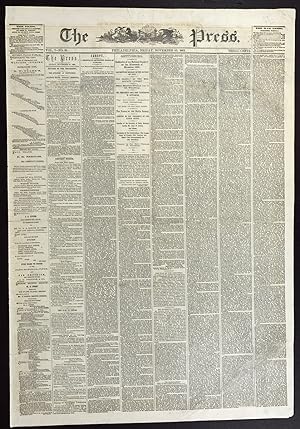About this Item
Newspaper, Philadelphia Press, Philadelphia, November 20, 1863. Complete, 4 pp., approx. 20 1/4 x 28 in. "The brave men, living and dead, who struggled here, have consecrated it far above our poor power to add or detract."Lincoln's Gettysburg Address is on page 2, along with Edward Everett's entire speech, and a report on the ceremonies. Printed in an important newspaper owned by John Forney, this version is in some ways more accurate than the more widely spread Associated Press report. John Wien Forney (1817-1881), had been a Democrat whose support for President James Buchanan brought appointment as clerk of the House of Representatives and lucrative printing contracts. However, after Forney lost his election bid for the U.S. Senate, he started the anti-Buchanan Philadelphia Press, and switched to the Republican Party in 1860, becoming a key Lincoln supporter. Forney again served as House clerk, and then secretary of the Senate until 1868. (In that position, he was one of only four men to sign the official 13th Amendment Resolution: President Lincoln, Vice President Hamlin, Speaker of the House Schuyler Colfax, and Forney, writing, "I certify that this Resolution originated in the Senate.") At the same time, he maintained his editorial "Letter from Occasional" column in the Press and established the Washington Chronicle, aimed at the public and to soldiers in the Army of the Potomac. He interviewed the President on issues such as freedom of the press and the probable effects of the Emancipation Proclamation, and was invited to consult about cabinet appointments. His White House access caused opponents to call him "Lincoln's dog."The night before the Gettysburg Cemetery, Forney got "roaring drunk and gave a violently pro-Lincoln speech" (Boritt). Given that history, he probably should not have been chosen to chaperone newly-elected vice president Andrew Johnson at the March 4, 1865 inauguration; Johnson was widely criticized for his drunken performance there. After Lincoln's assassination and Johnson's veto of the Freedman's Bureau Act in 1868, Forney changed positions and campaigned for impeachment. Selling the Chronicle and returning to Philadelphia, the chameleon-like editor switched back to the Democrats, and started a weekly magazine, The Progress. In addition, he served as a director of the Texas & Pacific Railway.Partial Transcript:"Four score and seven years ago our fathers brought forth upon this continent a new nation, conceived in liberty and dedicated to the proposition that all men are created equal. [Applause] Now we are engaged in a great civil war, testing whether that nation, or any nation so conceived and so dedicated, can long endure. We are met on a general battle-field of that war; we are met to dedicate a portion of it as the final resting place of those who here gave their lives that that nation might live. It is altogether fitting and proper that we should do this, but in a larger sense we cannot dedicate, we cannot consecrate, we cannot hallow this ground. The brave men, living and dead, who struggled here, have consecrated it far above our poor power to add or detract. [Applause] The world will note, nor long remember, what we say here, but it can never forget what they did here. [Applause]. It is for us, the living, rather to be dedicated here to the unfinished work that they have thus far so nobly carried on. [Applause]. It is rather for us here to be here dedicated to the great task remaining before us, that from these honored dead we take increased devotion to that cause for which they here gave the last full measure of devotion. That we here highly resolve that the dead shall not have died in vain. [Applause] That the nation shall, under God, have a new birth of freedom, and that the Government of the people, by the people and for the people, shall not perish from the earth. [Long applause. Three cheers given for the President of the United States and the G. (See website for full description). Seller Inventory # 25971
Contact seller
Report this item
![]()
